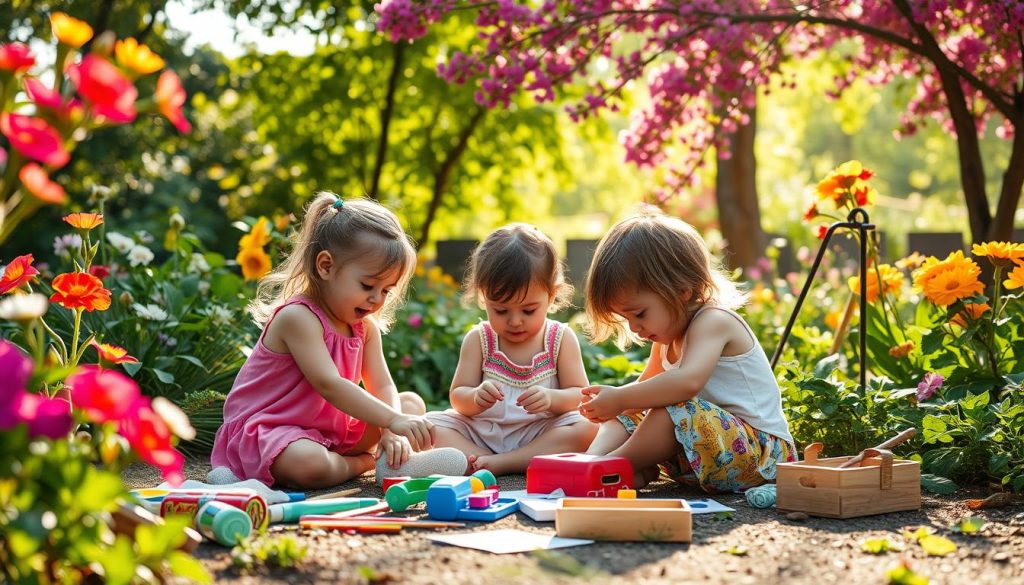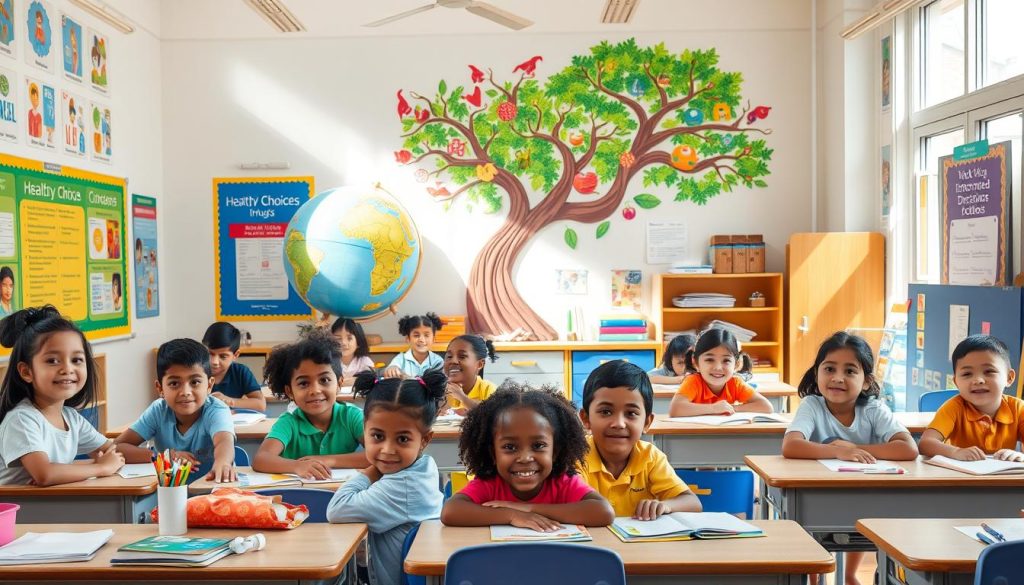Ever thought about when to start talking to your kid about drugs and alcohol? It’s a big challenge for parents. Kids as young as 5 to 7 might hear about substances. It’s key to talk about it early to help them make good choices.
Talking about drugs, alcohol, and tobacco should be ongoing. Use everyday moments to make these talks easier. Explain the dangers of substance use, like bad choices and legal trouble. This way, you can teach your child to make smart decisions.
Key Takeaways
- Engage in conversations about drugs and alcohol when your child is between the ages of 5 and 7.
- Utilize everyday situations as teachable moments to build trust with children.
- Provide clear and age-appropriate information about the risks of substance abuse.
- Maintain open communication to foster a healthy lifestyle and responsible choices.
- Emphasize the legal and health consequences of substance use.
Understanding the Importance of Early Conversations
Talking to kids about drugs and alcohol early is key. It starts a conversation and stops wrong info. It builds trust and lays a solid base for talking about tough topics later. We’ll see why starting early, using teachable moments, and encouraging open talk is so important.
Why Start Early?
Children’s health and safety are crucial for their happiness. Talking about drugs and alcohol early boosts their thinking and feeling skills. It also helps them handle peer pressure and emotions better.
Parents’ views and actions also play a big role. So, starting these talks early is very important.
Teachable Moments in Daily Life
Everyday moments, like seeing drugs in movies, are great for these talks. They fit into your family’s life, showing kids what’s right. This way, you teach them values and dangers of drugs.

Setting a Foundation for Open Communication
Building open talk with kids takes time. Start with small steps and regular chats. This helps them learn and grow, building empathy and trust.
As you show healthy choices, your child will be more open and eager to talk. This is a great way to help them grow.
Educating Yourself and Your Child
To talk about drugs and alcohol with your kids, you need to know the facts. This section will give you the basics. This way, you can guide your child and help prevent substance abuse.

Know the Facts About Common Substances
Learning about alcohol, marijuana, inhalants, and nicotine is key. It helps you talk to your kids about these topics. Knowing the facts lets you share accurate information and clear up myths.
This is crucial for teaching kids about drugs. It makes sure your talks are based on real data, not rumors or wrong information from the media.
Providing Age-Appropriate Information
It’s important to match your message to your child’s age. Young kids need simple, reassuring talks. Older kids can handle more detailed info about risks and laws.
By giving the right info at the right time, you help your child understand. This is a key part of preventing substance abuse.
Dispelling Myths and Misinformation
It’s also vital to clear up myths and wrong info. Kids see many drug and alcohol portrayals in media and from friends. These can be misleading.
By talking about the real effects of drugs and alcohol, you give your child the truth. This helps them see things clearly and avoid bad choices. It’s a big step in keeping them safe from substance abuse.
Addressing Parenting Challenges: Navigating Difficult Conversations
Talking to your kids about drugs and alcohol can be tough. But with gentle parenting, you can make it safe and open. Stay calm, firm, and nonjudgmental to keep trust and avoid fights.
When you talk about tough topics, like teaching consent, be clear. Make sure your child knows your family’s rules against drugs. Also, listen to their feelings and views. This helps teach them about consent and respect.

Use role-playing to help your child deal with peer pressure. It makes them more confident in real-life situations. This way, they learn to make good choices without drugs.
It’s key to show your kids how to handle stress healthily. They learn from what they see in you. Do things like exercise or nature walks to reduce stress and cut down on screen time.
In today’s world, kids see bad stuff online early. Start talking about drugs, alcohol, and consent early. Use resources like NPR and Sandy Hook Promise for help.
Don’t forget about mental health. Kids are facing more anxiety, depression, and self-harm. Encourage them to talk about their feelings. Get help if you need it.
By being empathetic, clear, and ready, you help your child face tough situations. They’ll learn to make good choices and stay healthy.
Strategies to Be Supportive and Encourage Healthy Choices
To help your child make good choices, create a supportive environment. This environment should encourage resilience and teach healthy coping strategies. Using positive parenting techniques is crucial. It helps your child feel good about themselves, be confident, and resist peer pressure.
Building Self-Esteem and Resilience
Boosting your child’s self-esteem and resilience is key. A study by the Centers for Disease Control and Prevention shows that positive parenting boosts self-esteem. This is vital for building resilience in children.
The American Academy of Pediatrics also notes that setting clear rules helps with self-control. This leads to responsible behavior.

Role-Playing Responses to Peer Pressure
Role-playing can help your child prepare for peer pressure. It helps them learn to respond confidently in tough situations. Talk openly about feelings and thoughts on substances, teaching them it’s okay to say no.
A study in the Journal of Adolescent Health shows honest talks with parents can prevent substance abuse. This is especially true for children.
Guiding Emotional Coping Mechanisms
Teach your child how to handle stress and peer influences. The National Institute of Mental Health says kids often copy their parents. So, being a good role model is very important.
Doing fun family activities and showing healthy emotional handling is key. This boosts your child’s resilience and coping skills.
Research from the American Psychological Association shows unconditional love and support are vital. Even when correcting behavior, it helps build a healthier relationship. Being involved in your child’s life through regular talks and activities is crucial for their well-being.
Conclusion
Talking about drugs and alcohol with your kids early is key to their future. Starting these talks early and weaving them into daily life builds a strong foundation for open dialogue. Studies by Panter-Brick et al. (2014) and Sheridan et al. (2010) show how important it is for parents to be involved.
Teaching self-esteem, role-playing, and emotional coping helps your kids make good choices. Family bonding is crucial for creating a safe space where your child can share their thoughts. These conversations come from a place of love and wanting to protect and empower your child.
If you face challenges, online family therapy can offer extra help. It’s great for strengthening your family’s communication. The National Academies Press also stresses the importance of talking openly about health issues. By discussing substance use, you’re taking a step towards a healthier future for your family.
FAQ
Why is it crucial to talk to children about drugs and alcohol at an early age?
How can I use daily situations as teachable moments for conversations about substance abuse?
What should be the focus of early conversations about drugs and alcohol?
How can I become well-informed to guide my child about drugs and alcohol?
How can I ensure effective communication while discussing substance abuse with my child?
What strategies can help my child resist peer pressure related to substance use?
How can I support my child’s self-esteem and resilience to promote healthy decision-making?
How should I wrap up conversations about drugs and alcohol to promote ongoing communication?
This post contains affiliate links. If you click on a link and make a purchase, I may earn a small commission — at no extra cost to you. Thank you for supporting this blog and helping me keep the patterns free! Read the full Affiliate Disclosure & Transparency.
